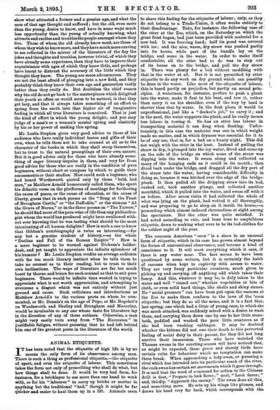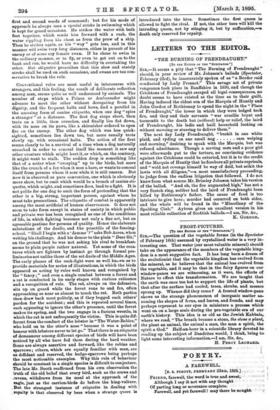ANIMAL ETIQUETTE.
IT has been noted that the etiquette of high life is by no means the only form of its observance among men. 'There is such a thing as professional etiquette,—the etiquette of sport, and even the etiquette of labour. This sometimes takes the form not only of prescribing who shall do what, but how things shall be done. It would be very bad form, for instance, for a bricklayer to use more than one hand to work with, or for his " labourer " to carry up bricks or mortar in anything but the traditional "hod," though it might be far quicker and easier to haul them up in a lift. Animals seem to share this feeling for the etiquette of labour; only, as they do not belong to a Trade-Union, it often works entirely to their disadvantage. Take, for instance, the following case of the otter at the Zoo, which, on the Saturday on which the great frost began, had just been provided with material for a new bed. It was freezing hard; half its pond was covered with ice ; and the nice, warm, dry straw was pushed partly into its house, while part of the bundle lay on the bridge, and some in the water. In order to make itself comfortable, all the otter had to do was to step out of its house on to the bridge, and pull the dry straw in. There was plenty for a bed without meddling with that in the water at all. But it is not permitted by otter etiquette to do any work on dry ground which can possibly be done in the water. Like most of the etiquette of labour, this is based partly on prejudice, but partly on sound prin- ciples. A waterman, for instance, prefers to push a plank into the water, make it fast to his boat, and tow it, rather than carry it on his shoulder, even if the way by land is shorter than that by water. In the first place, it would be unprofessional, just like a "docker's job," to carry it ; and in the next, the water supports the plank, and he really incurs less labour in towing it. So has an otter less labour in transporting material it can drag when floating. Unfor- tunately, in this case the material was one in which weight made no matter, and in which dryness was essential for it to be of any use, that is, for a bed on a frosty night. This did not weigh with the otter in the least. Instead of pulling the straw in dry, it plunged into the icy water, dived and came up on the side of the bridge on which some of the straw was dipping into the water. It swam along and collected as many of the hanging ends as it could in its mouth ; then dived back under the bridge, and dragged all the dry part of the straw into the water, having considerable difficulty in doing so, because it was hitched over the edge of the bridge- plank. It then pulled all the dripping straw into its bed, rushed out, took another plunge, and collected another mouthful, which it pulled into the water, and swam off with it as before. After seven visits it had collected the whole of what was lying on the plank, had wetted it all thoroughly, and was preparing to go to sleep on it inside its house,—a proceeding which almost induced rheumatism at sight among the spectators. But the otter was quite satisfied. It had acted according to rule, and been true to amphibious etiquette, down to soaking what were to be its bed-clothes for the coldest night of the year.
The common American " coon " is a slave to an unusual form of etiquette, which in its case has grown almost beyond the forms of conventional observance, and become a kind of conscience to it. It will wash everything which it eats, if there is any water near. The fact seems to have been questioned by some writers, but it is certainly the habit of racoons when kept in captivity with access to water. They are very fussy particular creatures, much given to picking up and carrying off anything odd which takes their fancy. And this, whatever it may be, is duly taken to the water and well "rinsed out," whether vegetables or bits of cloth, or even solid hard things, like shells and shiny stones. No "social pressure" can have been put upon the racoons at the Zoo to make them conform to the laws of the 'coon etiquette ; but they do so all the same, and it is a fact that, last spring, one which had a litter of young ones, to which she was much attached, was suddenly seized with a desire to wash them, and carrying them down one by one to her little stone- bath, paddled and washed the poor little creatures as if she had been washing cabbages. It may be doubted whether the kittens did not owe their death to this perverted feeling of social duty in their parent, for they did not long survive their immersion. Those who have watched the Thames swans in the courting-season will have noticed that, as might be expected, these grave and stately birds have certain rules for behaviour which no temptation can make them break. When approaching a lady-swan, or pursuing a rival which has intruded into its particular reach of the river, the cock-swan has certain set movements which it goes through. It is said that the word of command for action in the Chinese drill is first, "Prepare to look fierce ;" next, "Look fierce;" and, thirdly, "Approach the enemy." The swan does all this, and something more. He sets up his wings like plumes, and. draws his head very far back, which corresponds with the.
first and second words of command; but for his mode of approach he always uses a special stroke in swimming which is kept for grand occasions. He strikes the water with both feet together, which sends him forward with a rush, the water rippling from his chest as from the prow of a ship. Then he strikes again, as his " way " gets less, and in this manner will swim very long distances, either in pursuit of his enemy or of some coy female swan. If he chose to swim in the ordinary manner, or to fly, or even to get out on to the bank and run, he would have no difficulty in overtaking the other. But etiquette prescribes that this slow and stately stroke shall be used on such occasions, and swans are too con- servative to break the rule.
Conventional rules are most useful in intercourse with strangers, and this feeling, the result of deliberate reflection among men, seems quite as well understood by animals. The number of steps which a Prince or Ambassador might advance to meet the other without derogating from his dignity, and the frequent halts and bows, find a parellel in the amusing form of canine etiquette, when one dog "spies a stranger" at a distance. The first dog stops short, then trots on a little, then crouches, and finally lies flat down, with its nose on its paws, like a skirmisher ordered to open fire on the enemy. The other dog which was less quick. sighted, sometimes lies down too, but more usually trots slowly up, with occasional halts. The action of the first seems clearly to be a survival of a time when a dog naturally crouched in order to conceal itself the moment it saw any other creature which might hurt it, or which, on the contrary, it might want to stalk. The sudden drop is something like that of a setter wher, "creeping" up to the birds, but more like the crouch of a fon when it sees a hare, or wants to conceal itself from persons whom it sees while it is still unseen. But now it is observed as pure convention, one which is obviously mere show, but to omit which would be a breach of canine eti- quette, which might, and sometimes does, lead to a fight. It is not polite for one dog to omit the form of pretending that the other is a big, strong, important person, against whom he must take precautions. The etiquette of combat is apparently among the most artificial of human observances. It does not seem to take form except in states of society in which public and private war has been recognised as one of the conditions of life, in which fighting becomes not only a fine art, but an agreeable pastime for persons of quality. Hence the elaborate salutations of the duello, and the punctilio of the fencing. school. "Shall I begin with a damme '?" asks Bob Acres, when writing his challenge. And his demur to the plain "Dear Sir," on the ground that he was not asking his rival to breakfast, seems to plain people rather natural. Yet some of the crea- tures which are fighters by instinct go through formal pre- liminaries not unlike those of the set duels of the Middle Ages. The early phases of the cock-fight were so well knewn as to provide materials for series of illustrations, in which the birds appeared as acting by rules well known and recognised by the " fancy ;" and even a single combat between a ferret and a rat is conducted in its early stages with curious reticence and a recognition of rule. The rat, always on the defensive, sits up on guard while the ferret runs to and fro, often approaching so near as almost to touch the rat. Both parties then draw back most politely, as if they begged each others' pardon for the accident ; and this is repeated several times, each appearing to ignore the other's presence, until the ferret makes its spring, and the two engage in a furious wrestle, in which the rat is not unfrequently the victim. This is quite dif- ferent from the conduct of the lobster in "The Water-Babies," who held on to the otter's nose "because it was a point of honour with lobsters never to let go." That there is an etiquette of demeanour among different species of birds will have been noticed by all who have fed them during the hard weather. Some are always assertive and forward, like the robins and yarrows; others, which are equally familiar with man, are as diffident and reserved, the hedge-sparrows being perhaps the most noticeable examples. Why this rule of behaviour should be constant in a single species is difficult to conjecture.
The late Mr. Booth reaffirmed from his own observation the truth of the old belief that every bird, such as the crows and zavens, withdraws from its meal at the approach of the eagle, just as the carrion-birds do before the king-vulture.
, But the strangest instance of etiquette in dealing with , royalty is that observed by bees when a strange queen is introduced into the hive. Sometimes the first queen is. allowed to fight the rival. If not, the other bees will kill the intruding queen, not by stinging it, but by suffocation,—a- death only reserved for royalty.



































 Previous page
Previous page